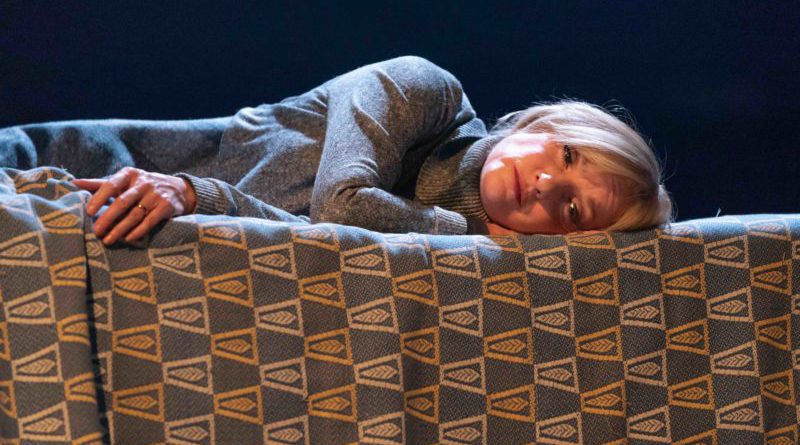REVIEW: ‘Pinter Five’ in London
Photo: Jane Horrocks, of Little Voice fame, stars in two of the three plays in Pinter Five, part of the Jamie Lloyd Company’s Pinter at the Pinter season. Photo courtesy of Marc Brenner / Provided by press agent with permission.
LONDON — Is there a more impressive theatrical experiment this year than Pinter at the Pinter, the Jamie Lloyd Company’s expansive, season-spanning presentation of Harold Pinter’s short plays? This reviewer can think of no other worthy candidate.
Lloyd and his company are staging the one-acts in a series of six evenings, which began in the fall and culminate in February. The capstone of the yearlong exploration is a production of Pinter’s Betrayal starring Tom Hiddleston.
At a recent performance of Pinter Five, which includes The Room, Victoria Station and Family Voices, it was immediately clear the genius of the project. Pinter, one of the most insightful and confounding playwrights of the 20th century, crafted mini masterpieces with these short plays, and the Jamie Lloyd Company and director Patrick Marber have put together a crack team of actors to convey the emotional, depth-filled roles of these three shorts.
The Room is perhaps the highlight of the three, much of its effectiveness due to Jane Horrocks’ touching, spot-on performance as a wife conversing with her silent husband. She has visible concern about the basement apartment in her tenement and the brutal cold that permeates the gray, drab setting of her small abode.
The first half of The Room essentially finds Rose (Horrocks) pacing around her apartment and making tea for her husband, Bert (Rupert Graves). Frequent topics are the cold, the world outside their four walls and, well, the cold again. It’s an interesting scene to open the play because Rose gives what amounts to be an unchallenged monologue because Bert stays silent, menacing and exuding some unspoken violence.
When visitors enter the fray, Rose and Bert’s domesticity changes to a different tune. There’s Mr. Kidd (Nicholas Woodeson), who has a sit-down and chat about being the landlord, although his role and true intentions are unclear, which is par the course in a Pinter play.
Then comes Mr. and Mrs. Sands (Emma Naomi and Luke Thallon). They seem to be interested in Rose and Bert’s apartment, but Rose is having none of it. As the expertly minimalist dialogue continues on, one gets the feel for what the Jamie Lloyd Company places in the promotional material for the show: “An all-too-familiar and frighteningly topical brand of English xenophobia runs through this darkly funny and unexpectedly odd play from 1957.”
Darkly funny? Check. Even though the circumstances turn dire, Rose and the visitors have certain turns of phrase that generate some chuckles at the Harold Pinter Theatre, where Pinter Five continues in repertory with Pinter Six until Jan. 26.
Unexpectedly odd? Check. This is Pinter after all.
When Colin McFarlane’s character turns up — a blind man who agitates Bert — sudden, terrifying actions take place, and all humor is gone. The audience is left with a bleakness that is difficult to comprehend, leaving a stinging feeling of voyeuristic guilt.
Horrocks, Graves and McFarlane do justice by Pinter’s words (or lack of them), and they are expert theatrical interpreters.
It’s amazing to consider that The Room is Pinter’s first play.
Victoria Station is the shortest of the three offerings, and also the slightest. It’s a routine comedy featuring Graves as a taxi driver who is having trouble communicating with his dispatcher, played by McFarlane. There is definitely some genuine comedy in the simple two-hander, especially from McFarlane’s impatience with Graves’ inability to dictate his precise location.
The short play (really a scene) has the hint of Monty Python, a back-and-forth that features frustration, good humor and a tad bit of mystery.
After Victoria Station, the evening ends with a walloping, emotional story called Family Voices, a radio play about a young man struggling to understand life and the relationship he has with his mother and deceased father. The action plays out in a bedroom set that constantly moves on a 360-degree pivot. Each of the three characters — played by Thallon, Horrocks and Graves — read monologue letters to the audience, explaining their side of the tortured relationship.
The son character, wonderfully brought to life by Thallon (who appears to be channeling Holden Caulfield), lives in a city’s apartment building and meets a motley variety of characters in the hallways. In his descriptions of his new living conditions, one can sense a palpable hurt and fear, also a clear disconnect with his mother. Yet there’s also energy and boundless inquisitiveness.
When Horrocks’ character speaks, that disconnect with her Thallon’s character is also present, and yet there’s a sense that these letters are being spoken/written in a vacuum and never properly delivered or appreciated.
At the end of these dramatic few minutes, Graves’ deceased father offers some thoughts, and it becomes obvious that the chasms amongst the members of this family are quite deep.
Pinter Five is an exemplary night at the theater, one that challenges the audience members and rightfully props up Pinter’s words as some of the finest examples of English playwrighting in the past 100 years.
By John Soltes / Publisher / John@HollywoodSoapbox.com
Pinter Five continues through Jan. 26 as part of the Pinter at the Pinter season by the Jamie Lloyd Company. The production, directed by Patrick Marber, stars Jane Horrocks, Rupert Graves, Colin McFarlane, Emma Naomi, Luke Thallon and Nicholas Woodeson. Click here for more information and tickets.

